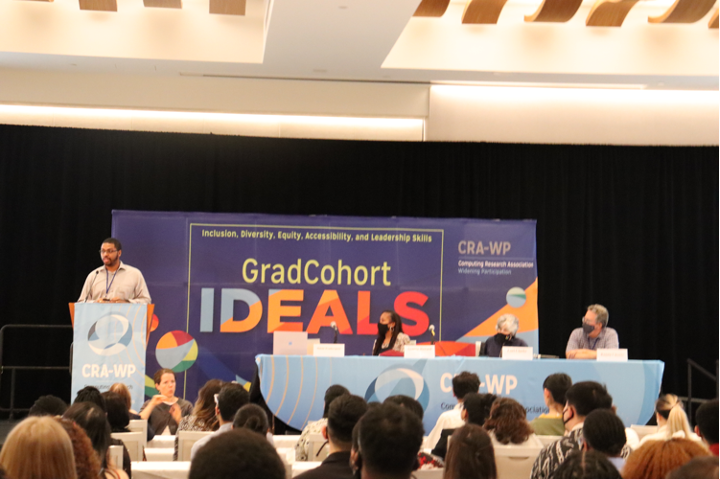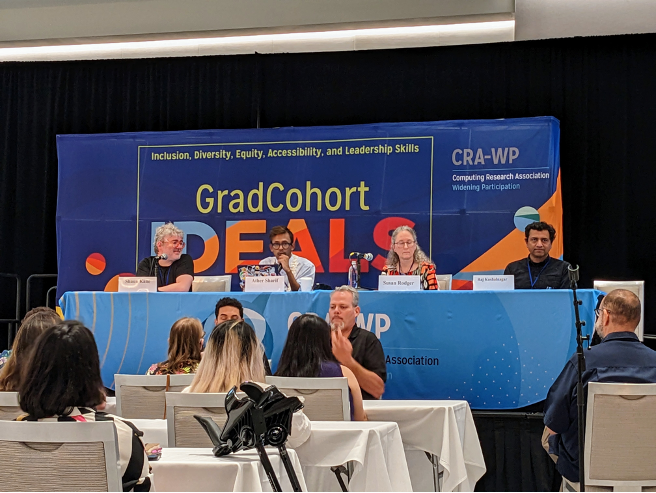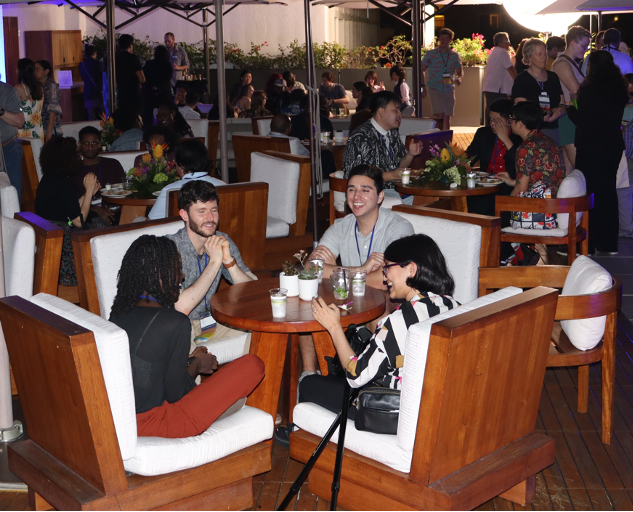Expanding the Pipeline: The CRA-WP 2023 IDEALS Workshop
The CRA-WP 2023 Grad Cohort Workshop for Inclusion, Diversity, Equity, Accessibility, and Leadership Skills (IDEALS) was held in Honolulu, Hawaii March 23-25. The workshop is part of an effort to widen the participation, access, opportunities, and experience of individuals in computing research by building and mentoring nationwide communities throughout their graduate studies. The workshop has three main tracks that focus on professional development for students at the early, mid, and later stages of their research programs. One hundred and twenty-five participants from over 86 MS and PhD graduate programs spent two days interacting with 30 senior computing researchers and professionals — 22 from academia, 6 from industry, and 2 from government — who shared valuable information and guidance on graduate school survival skills, as well as more personal stories and insights about their own experiences.
The IDEALS Workshop began with a Welcome Reception Thursday evening, where participants were able to meet and interact in an informal setting. Friday’s full day of events began with a Welcome session that guided participants through the flow of the two-day program. Friday’s agenda offered three morning sessions and three afternoon sessions, with lunchtime conversations organized by research areas ranging from Artificial Intelligence and Robotics to Speech and Natural Language Processing.

Figure 1: The 2023 IDEALS Program Co-Chairs Hakim Weatherspoon, Ayanna Howard, Lori Clarke, and Ramón Cáceres welcome participants
For participants early in their research program, the session “Perspectives from Grad Cohort Alumni,” brought together researchers Dr. Heriberto Acosta-Maestre, Dr. Pamela Gibbs, and Marilyn Iriarte to share their experiences. Dr. Acosta-Maestre is a Technical Program Manager with the Puerto Rico National Guard. Dr. Gibbs is a Strategic Research/Leadership Fellow at Anita B.org and Iriarte is a PhD student at the University of Maryland. This session was designed to provide the opportunity for participants to hear from past Grad Cohort participants about their experiences, lessons learned, and how the program has influenced them throughout their careers. The panelists provided insightful on how to get the most out of the workshop and their graduate school experience. Other early-year topics included “Finding an Advisor and Developing an Effective Working Relationship,” “Overcoming Insufficient Academic Preparation: Perceived and Real,” and “Networking.”
For mid-stage graduate student participants, the session “Finding a Research Topic & Interdisciplinary Research” presented by Dr. Melanie Moses and Dr. Armando Solar-Lezama was invaluable. The presenters shared their own winding paths, full of “twists and turns, false starts, new beginnings, and crossing paths”. Dr. Solar-Lezama, a Professor and the Associate Director and COO of the MIT Computer Science and Artificial Intelligence Laboratory works in the area of program synthesis, which combines programming systems and artificial intelligence. He shared examples of successful papers in research areas that others had overlooked or had assumed would not be productive. Dr. Moses, who holds joint appointments as a Professor in Computer Science and Associate Professor of Biology at the University of New Mexico, shared her experience studying ants in Costa Rica and pondering “How do we get cooperation?” in her study of autonomous robots, and discussed how she uses her study of complex biological systems to inform diverse research topics such as the scaling properties of how blood moves through the body, how volcanic eruptions impact climate change, and how we encourage algorithms that create more justice in the world.
In the session “Building Resiliency & Overcoming Failure,” Dr. Raja Kushalnagar and Dr. Gloria Washington shared their own challenges of navigating academic institutions that were not designed for them. The presenters defined resilience as “the capacity to recover quickly from difficulties”. Dr. Kushalnagar, professor and director of the Information Technology program in the school of Science, Technology, Accessibility, Mathematics, and Public Health (STAMP) at Gallaudet University is deaf. He shared his challenges in finding access to services in academic environments, building connections with peers, teachers, faculty, and mentors, and the difficulty of finding employment after finishing his PhD. He began his academic career at a large research university, but quickly found that the connections that he built during his elementary and secondary education did not apply, and switched to a smaller university where he could establish a stronger rapport with faculty, staff, and other students. During his PhD program, the technology he relied on broke, and the company that designed it went out of business, causing him to lose three years of progress. This led him to work in assistive technology and providing access to that technology for a variety of individuals. Dr. Washington, an associate professor in computer science at Howard University, received her undergraduate education at a small historically Black university with expectations that she would get a job in government, and shared her journey of reinvention. She moved to Washington, DC, and got a security clearance while working for the National Security Agency. Dr. Washington completed her MS and PhD at George Washington University, while working full-time by day as a contractor and taking courses at night because fellowships at the time did not pay enough to live on. This made her journey to the PhD longer than most, but she leveraged her network of people to do research at a variety of government agencies. Because all her work was classified, it was a challenge finding a job post-PhD, so she began a 3-year post-doc position in South Carolina. She found support through fabulous mentors at Clemson University, where Dr. Juan Gilbert gave her the opportunity to hone her research and publish. She applied to and received an academic faculty position in the computer science department at Howard University, where she runs the Biometrics Lab and performs research with her students on affective computing and biometrics and enjoys the opportunity to help others find their path via undergraduate research.
In the session “Empowerment of People with Disabilities”, panel moderator Ather Sharif introduced panelists Shaun Kane, Susan Rodger, and Raja Kushalnagar, who shared why empowerment in higher education is important for people with disabilities, addressing empowerment in academic settings, the challenges of invisible disabilities and disclosure, and access to and use of assistive and accessible technologies for students with disabilities.

Figure 2: Empowerment of People with Disabilities Panel with Shaun Kane, Moderator Ather Sharif, Susan Rodger, and Raja Kushalnagar
In the Later Years track, sessions covered an array of topics such as what students can expect when they follow either academic or non-academic career paths beyond their graduate degrees. The session “Building Your Professional Persona” was presented by Dr. Pamela Gibbs, Strategic Research/Leadership Fellow at Anita B.org , and Dr. Rosemary Shumba, Chair of the Department of Computer Science at Bowie State University. They stressed the importance of making intentional choices about how to present yourself in professional contexts. They also discussed the need to maintain an effective online presence.
Friday late afternoon closed with the presentation of 50 Lightning Talks covering a broad set of topics: Accessible Computing, AI, Bio and Medical Informatics, CS Education, Data Science, Distributed Computing, Economics and Computation, Machine Learning and Data Mining, Natural Language Processing, Quantum Computing, Robotics, Human Computer Interaction, Security and Privacy, and Speech and Natural Language Processing. Participants were able to provide a quick overview of their research and answer one or two questions from the audience. The day closed with a reception and another opportunity for participants to meet, network, and dive deeper into some of the day’s discussions.

Figure 3: IDEALS participants, speakers, and staff enjoy the Friday evening outdoor reception
Saturday offered three morning sessions, with final and closing remarks thanking Dr. Lori Clarke for her years of dedication to the CRA-WP Board and advocacy and leadership in developing and nurturing the IDEALS Workshop program to its present form. A second day of lunch with table topics was provided over a variety of diverse topics ranging from Publishing Research to Prioritizing Mental/Physical Health in Graduate School. The afternoon offered 1-1 mentoring on both individual academic and career advising and individual resume and CV advising. The late afternoon closed with an AccessComputing Community Meetup.
Warm thanks to all the speakers, panelists, and participants for making the workshop a resounding success, and to the CRA staff, who put in countless hours planning and organizing the venue and facilitating its smooth operation, ensuring the safety, comfort, and accessibility of participants
About the authors:
Dr. Patty Lopez is currently a consultant for New Mexico State University (NMSU), a Hispanic Serving Institution where she is a distinguished alumna. Prior to her role at NMSU, she spent 13 years as a Senior Platform Application Engineer at Intel and 19 years as an imaging scientist and software developer at Hewlett-Packard. Patty has seven patents and over 20 years of experience in diversity and inclusion work. She is a member of the CRA-WP Board, the Computing Alliance for Minority Participation Board, and the National Academy of Sciences, Engineering, and Medicine’s Roundtable on Systemic Change in Undergraduate STEM Education.
Dr. Ayanna Howard is the Dean of Engineering at The Ohio State University. Previously she was the Chair of the School of Interactive Computing at the Georgia Institute of Technology. Dr. Howard’s research encompasses advancements in artificial intelligence (AI), assistive technologies, and robotics, and has resulted in over 275 peer-reviewed publications. She is a Fellow of IEEE, AAAI, AAAS, the National Academy of Inventors, and elected member of the American Academy of Arts and Sciences. Prior to Georgia Tech, Dr. Howard was at NASA’s Jet Propulsion Laboratory where she held the title of Senior Robotics Researcher and Deputy Manager in the Office of the Chief Scientist. She is a member of the CRA-WP Board and a co-lead of the CRA-WP IDEALS Workshop.
Dr. Lori A. Clarke is an emerita professor in the College of Information and Computer Sciences, University of Massachusetts Amherst, after serving on the computer science faculty for forty years and as chair from 2011-2015. She is a Fellow of the ACM and IEEE, and a board member of the Computing Research Association’s Committee on the Status of Women in Computing Research (CRA-W). She is a former vice-chair of the Computing Research Association (CRA), co-chair of CRA-W, IEEE Publication Board member, associate editor of ACM TOPLAS and IEEE TSE, member of the CCR NSF advisory board, and ACM SIGSOFT chair. Awards include the 2012 SIGSOFT Outstanding Research Award, 2011 University of Massachusetts Outstanding Accomplishments in Research and Creative Activity Award, the 2009 College of Natural Sciences and Mathematics Outstanding Faculty Service Award, the 2004 University of Colorado, Boulder Distinguished Engineering Alumni Award, and the 2002 SIGSOFT Distinguished Service Award. Dr. Clarke’s research is in the area of software engineering. She is one of the initial developers of symbolic execution and developed one of the first model checking systems applicable to software systems. She has also worked in requirements engineering and object management. Recently she has been investigating applying software engineering technologies to detect errors and vulnerabilities in complex, human-intensive processes in domains such as healthcare and digital government. She is also involved in efforts to increase the participation of underrepresented groups in computing research.
Dr. Ramón Cáceres is a software engineer at Google, where he has built privacy infrastructure that serves more than a billion people every day. He was previously a computer science researcher at Bell Labs, AT&T Labs, and IBM Research. He has also held leadership positions in several startup companies. His areas of focus include computer systems and networks, mobile computing, human mobility, security, and privacy. He is an IEEE Fellow, an ACM Distinguished Scientist, and a recipient of the SIGMOBILE Test-of-Time Award. He is a member of the CRA-WP Board and a co-lead of the CRA-WP IDEALS Workshop.







